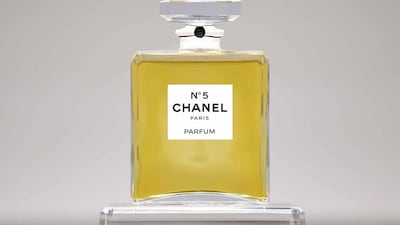Think of the French luxury house Chanel, and one of the first things that comes to mind is the perfume, Chanel No 5.
While the famous square bottle adds to the allure, the reason for its enduring success is of course, the liquid inside, which although a century old remains as enticing and evocative today as when it first launched in 1921. In that recipe, jasmine is a key ingredient.
Chanel uses jasmine from the town of Pegomas, near Grasse, in France. The region was a centre of leather making until the 17th century, when local tanneries began using local flowers to scent leather gloves created for the nobility.
Realising the scent captured from flowers grown in the region surpassed that of anywhere else in France, the area was soon given over to the farming of flowers, and with it the making of perfumes. Today, Grasse is the heartland of the world's perfume industry.

In the French region of Provence, at almost 1,150 metres above sea level, the area enjoys its own microclimate, with weather mild enough to make it one of the few European areas beyond the Mediterranean where jasmine can grow outside. Typically, bathed in more than 300 days of sunshine per year, with a mineral-rich clay and limestone soil, the flowers grown here have become prized for their intense aroma.
Since the 1980s, Chanel has worked with a local farming family, the Muls, to grow Jasmine Grandiflorum or large flowered jasmine that produces big, star-shaped white flowers and a sweet, powdery scent.

Too delicate to harvest by machine, each flower must be collected by hand and are picked at dawn when the scent is most intense. As the flowers' fragrance declines over the course of the day, the harvest must be completed at no later than 1pm, picking only three kilograms of flowers a day, made up of 8,000 flowers per kilogram. To create as little as one litre of distilled jasmine essence, 650kgs of flowers must be gathered. The jasmine of the region is so highly prized, it has had its own festival in August, since 1946.
To help protect this niche industry, Chanel has purchased an additional 100,000 square metres of land, to add to the existing 200,000 square metres (20 hectares) where this unique jasmine is grown.
More than just a luxury house, Chanel is using its position and power to help preserve the unique artisan heritage of France.
In addition to supporting the jasmine industry, the maison has invested in buying up the small-scale, specialist ateliers that work in haute couture. These tiny studios include the likes of the silversmith Maison Goossens; the embroidery experts Lesage; Maison Desrues, makers of costume jewellery and buttons; Maison Lemarie that works with feathers and Les Ateliers Lognon that creates pleated fabric.
To lose any of these skilled houses that carry unique techniques would be a blow to the storied world of haute couture. Determined to help ensure such specialist knowledge has a long term future, Chanel has put aside self-interest to ensure the studios can continue to work with other haute couture designers.

